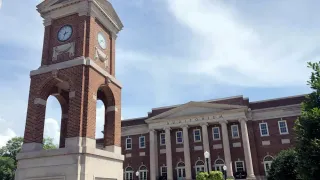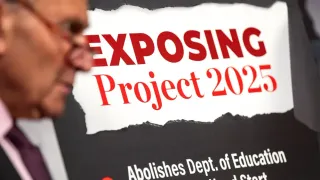July 19, 2022
Berkeley Rep's 'Sanctuary City' Sends Up Flares
Jim Gladstone READ TIME: 4 MIN.
"You are never, ever, ever going to be able to get married!" sneers a furious young woman at her one-time high school confidante and crush, hurling a Molotov cocktail of venom and heartbreak.
Her outburst takes place just a few minutes after she's been abruptly introduced to her old friend's male romantic partner in "Sanctuary City," playwright Martyna Majok's gut-wrenching, personal-is-political drama, set between 2001 and 2005 and now playing at the Berkeley Rep.
If you've already seen this electrifying production, you might be inclined to consider the scene description above to be a so-called spoiler. But if you're an occasional theatergoer who opts for plays that have been promoted as featuring queer content –and thus wouldn't have this show on their radar– my unnecessary over-discretion would be the real spoiler. "Sanctuary City" belongs on your must list.
Frankly, if the reveal of a character's homosexuality actually served as a spoiler-enabling plot twist, I'd likely be panning "Sanctuary City."
Queerness is inherent to character: To hide it, then spring it on audiences like a winking jack-in-the-box is retrograde playwriting, circa "Deathtrap." That's not at all what Majok is up to.
In "Sanctuary City," she aims to make us think about the intimidating, omnipresent threat of the U.S. government interfering in our personal histories and private lives; whether by forbidding same sex marriage or by throwing roadblocks onto paths to citizenship; whether we're immigrants, brown-skinned people, women, queer folks or, like the characters in this play, double- and triple-jeopardized intersectional combos.
Both G, the female character (María Victoria Martínez, convincingly skittish, impulsive and well-intentioned), and B (Hernán Ngulo), her teenage soulmate, are undocumented immigrants, brought to the U.S. as children by their mothers. Growing up impoverished in Newark, New Jersey, they're accustomed to maintaining the lowest of public profiles in an effort to avoid deportation.
Nearly crippled by internalized fear and anxiety –even more so, in the wake of 9/11, when non-Caucasians automatically trigger suspicion– the pair personify learned helplessness. G and her mother are abused by a series of violent men; B's mother drinks, gets depressed and is cheated out of her restaurant wages by a crooked boss. The teenagers cling to each other, spending most nights chastely huddled under B's bedcovers trying to ride out the storm of their lives.
While some opening night audience members were audibly surprised to learn that B was gay about an hour into the intermission-less show, others were no doubt conscious of the probability early on; clued in both by the awkward reticence Majok has written into the character's lines and an exquisitely sensitive performance by Angulo, who, over the course of the evening, makes us feel the bone-deep ache of a sweet soul becoming slowly, inexorably embittered.
Staged by director David Mendizábal in a potent collaboration with his design team of David I. Reynoso (set), Cha See (lighting), and Fan Zhank (sound), the play's events all take place in a grey-beige urban setting literally suggestive of tenement housing and more generally evoking the bowels of institutional America. Jolts of sizzling light and noise accompany G and B's struggles within their bland surroundings, belying this built environment's intended anonymization and neutralization of what goes on behind its walls.
Majok's choice to have the events of "Sanctuary City" end in 2005 is a fascinating one. While same-sex marriage was indeed illegal at the time, audiences know that G's dismissive assumption about B's gay relationship proved inaccurate; that at least one law based on institutionalized social prejudice was eventually changed.
But should we find optimism in this hindsight? Today, the path to citizenship for DREAMers remains uncleared, and the right to bodily autonomy is once again in a precarious state. Will sparks of humane illumination like Obergfell vs. Hodges further combust, burning down walls that divide and obscure? Or are those brief flashes of light just desperate final spikes on the heart monitor attached to a dying body?
Sanctuary City through August 14. Berkeley Rep, 2025 Addison St. $20-$116. (510) 647-2949. www.berkeleyrep.org
Help keep the Bay Area Reporter going in these tough times. To support local, independent, LGBTQ journalism, consider becoming a BAR member.






